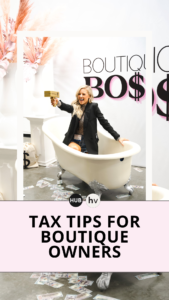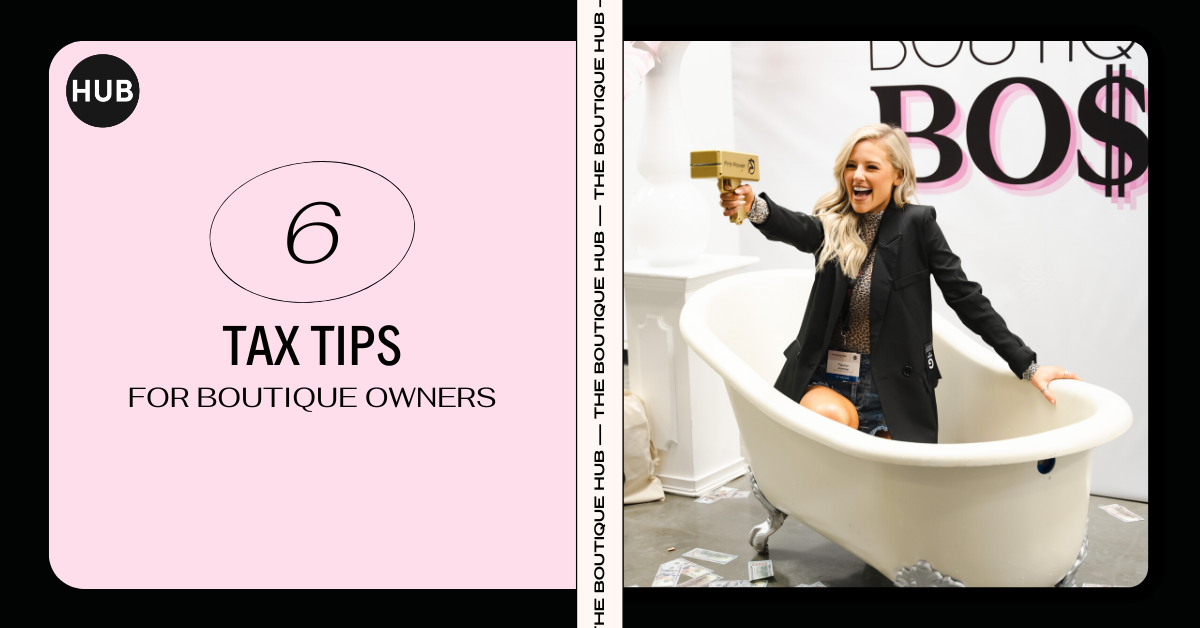This article provides 6 boutique owner tax tips to keep your business afloat.
Around this time each year there seems to be this little black cloud that appears when you open your Quickbooks Account. It’s the shadow of a man also known as…your accountant.
Now before you run off because the thought of crunching numbers, gloomy cubicles, and drab tax returns is the last thing you want to think about, hear me out. These tips aren’t coming from Gary* in Payables whose idea of fashion is wearing a Snoopy Christmas tie in December and only leaves his desk to eat his same bologna sandwich every day.
This is coming from a boutique-loving, skirt-wearing, I-want-to-be-your-friend kind of gal who also happens to have financial and accountant experience and has worked at The Hub for years.
(*I have nothing against people named Gary or those who work in the Payables Department; I simply needed a name to use!)
Here are a few easy to follow tax tips for you to make keeping your financials organized is a breeze. So, the thought of Gary no longer gives you nightmares.

6 Tax Tips for Boutique Owners
1. Keep your business and personal expenses separate.
This is a good habit to get into when you are just starting out. I know it can be difficult when you are investing your own money into the business and grab some extra office supplies while you’re at Target with the kids, but it is important to keep things separate. Set up a business checking and savings account with your bank and get a company credit card. This will help you not only with your taxes and determining which expenses you can deduct but also so you can see how much of a profit (or loss) you are making. Which leads me to….
2. Actually look at those reports in your bookkeeping program!
Do you remember seeing the tab labeled ‘Reports’? Actually generate one! Play around with the date filter and compare your expenses by the month or year. Your Profit and Loss Report (aka Income Statement) will show your revenue (money brought in) less your expenses (money spent on that midnight pizza order when you were researching next season’s trends). As a business owner, you want to know what is going on with your finances so you can either invest money in a new area (can you say mobile boutique truck??) or decrease your unnecessary expenses until your next busy season (maybe one less pizza this week). After all, YOU are the #BoutiqueBoss so YOU are the one in charge.
3. Don’t avoid your bookkeeping or filing your taxes.
I get it. Bookkeeping is boring. It’s like listening to your husband talk about your car’s engine or watching C-SPAN. However, just like a sore tooth, it doesn’t go away if you avoid it. It just gets worse. Set apart time in your schedule, whether it be every day or week or month, to enter in your receipts, update your invoices, and pay the bills. Also, even if you got away with not filing or paying your taxes once, the IRS will catch up to you. And there will be interest. There’s only two things in life that are definite – death and taxes.
4. Keep a mileage log. (And other receipts)
Just because you guess that you used your vehicle 20% of the time for business doesn’t mean you can deduct it for mileage expenses on your tax return. The IRS likes documentation, and if you get audited and can’t prove the miles driven for business use, you may get more than a slap on the wrist. Keep a mileage log like the one found here and retain all of your receipts as actual proof of the expenses for your business.
5. Ask for help
You wouldn’t try to install your own plumbing or mend your own broken bone so why do you feel the need to do all of your accounting and tax work on your own? Let the professionals who have the knowledge take care of it for you. It is so much better to prepare and plan for the future rather than look back and ask, “Should I have done it like this?” Whether you are just starting out and wondering which business entity is the best fit for you (sole proprietorship, partnership, corporation, etc.) or you are looking to invest in a second storefront and want to go over the tax implications, talk to an accountant! It is better (and more cost effective) to have someone guide you through your financial choices rather than look back and wonder how you’re losing money on your dream business.
6. Organization
The key to successful finances comes down to organization. Although we all have busy lives and don’t have time to file & label everything like we see done on Pinterest, simple steps can help build good habits. Put all of your business receipts in a shoebox. Keep your kids out of your home office. Actually use those colorful folders that you bought at Target. Because at the end of the day, both you and your accountant want the same thing – success in your business.
XO,
Beth
BoutiqueHubTeam
*Beth is not a Certified Public Accountant and does not claim to be an expert in the field of accounting. Her blog post is only meant to be a guide for you. Please consult your accountant, financial advisor, or the Internal Revenue Code before making any financial decisions.
We hope you loved our article on Boutique Owner Tax Tips. How else can The Boutique Hub help you grow?
Get more information on growing your business by joining The Boutique Hub where we have tons of training, information, and most importantly, connection! www.theboutiquehub.com/join Try out our service for a month, cancel anytime.

